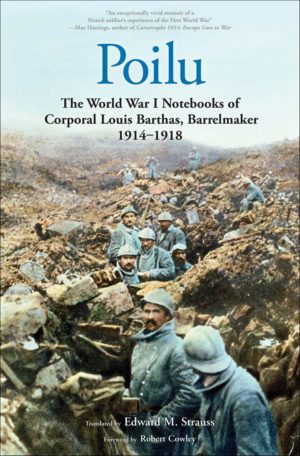Le livre : Poilu. The World War I Notebooks of Corporal Louis Barthas, Barrelmaker 1914-1918, translated by Edward M. Strauss, foreword by Robert Cowley, New Haven & London, Yale University Press, 2014.
1] En traduisant le livre de Louis Barthas, vous n’avez pas répondu à une demande d’éditeur. C’est vous qui l’avez décidé. Pouvez-vous nous dire ce qui vous a motivé ?
Réponse : It’s true that I did not respond to a request initiated by a publisher. Here is what happened. One day I asked my friend and colleague Robert Cowley, editor of the successful “What If” books of counterfactuals by renowned historians, to suggest to me a book in French about the Great War of 1914-1918 that really should be translated into English, and had not yet been, which I proposed to try to do. Rob immediately suggested the “Carnets de Guerre de Louis Barthas,” which he knew in its French edition. With the agreement of the French publisher (La Découverte) and the enthusiastic support of anglophone historians in the UK, US, and elsewhere (notably Prof. Jay Winter of Cambridge and Yale), Yale University Press agreed to publish my English-language annotated version, which was published in March 2014 and in paperback a year later.
2] Est-ce que la traduction vous a posé des problèmes particuliers ?
Réponse : The French version from which I translated posed no problems at all. For a workingman, Barthas was an incredibly literate author. He was meticulous about places and dates, which made the spotting of places and the tracing of his journeys on maps very easy. (There were no maps in the French versions).
3] Comment avez-vous trouvé cet éditeur de grande réputation (Yale) ?
Réponse : Jay Winter, professor of history at Cambridge and Yale, recommended my proposal to Christopher Rogers at Yale University Press (Chris is now retired).
4] Le livre en anglais est accompagné de commentaires d’historiens faits avant la parution. Comment les avez-vous obtenus ?
Réponse : The favorable quotes about the English-language book (called “blurbs” in American speech) were requested and collected by Yale University Press and came from a variety of historians, media, and myself. This is standard practice in the US and UK, even for academic works of history. Staff at the publisher usually coordinates this activity.
5] Je me souviens d’échos très favorables dans la presse américaine, notamment dans des titres prestigieux. Pouvez-vous revenir là-dessus ?
Réponse : Same as 4. The publisher sends “galleys” (advance copies of the book) to credible critics who are then ask to review the book and offer an opinion, usually positive.
From The New York Times : A Gimlet-Eyed Grunt, Soldiering Balefully Through a War’s Horrors : In the newly translated memoir “Poilu,” a Frenchman offers acidic observations on trench warfare while serving on the Western Front.
6] Comment marche le livre ? Dans les trois formules : hard, paper et e-book ? Réponse : The last sales figures for the English-language “Poilu” I have seen, dating to about a year ago, were about 15,000 worldwide. That’s considered a success in academic/university book publishing, I believe. I have asked for updated data but have not yet received it. I would welcome any further questions from you or anyone else.
